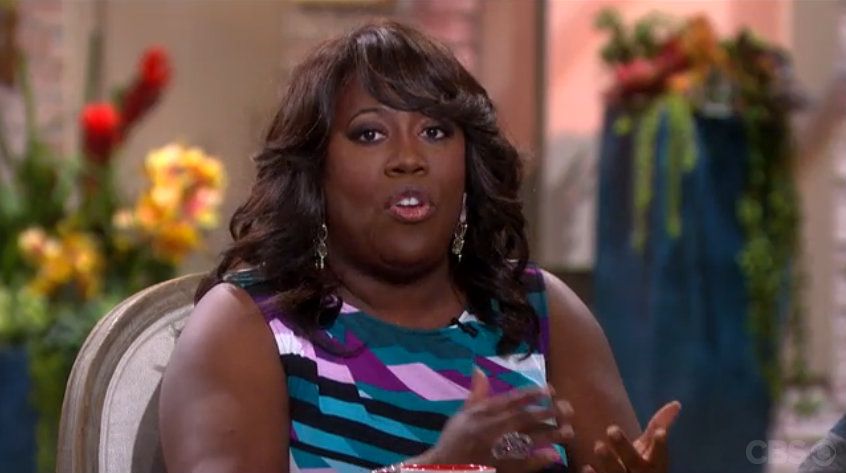Learning from Sheryl Underwood: It's Time to Stop Back-Biting

Sheryl Underwood opened a door of discussion about African American women and how we view one another by disclosing on THE TALK a conversation that she unknowingly listened in on where she was the topic of discussion. Sheryl disclosed the names of her fellow comedians that felt some kind a way about her appearance and character. Distraught and probably hurt by the negativity, Sheryl confessed that she ‘was bruised, but not broken’. In the days since Underwood’s confession, critics and fans alike have pounced on the salaciousness of the ‘secret’, the women who were named as the ‘back-stabbers’ and the inspirational aftermath. What we as African American women have yet to discuss and explore is the roots of such negative conversation and why engaging in it is harmful.
Now, I am by no means innocent or an innocent by stander in back-biting and hateful conversations about other African American women. Sisters have a distinct habit of cutting down each other that begins in elementary school. I grew up in the 1970’s and the hatefulness was brutal because that was the era when weaves and extensions were left to those who were in the entertainment world. This meant that a lot of young sisters who had less that the perceived desirable hair and length were literally dragged and publicly humiliated. I cannot recount the many times I have heard other girls yell out ‘you bald-headed heffa’ during my school years. Then as young sisters became junior high or middle school age, the hatefulness continued.
We as African American women have ripped one another apart from the cradle to old age. That is why what Sheryl Underwood disclosed on daytime television isn’t foreign to me. I have heard it before and in some shameful instances, indulged in back-biting and harmful gossip and conversation. But what can all of us learn from it? What should the discussion now turn to? Should the discussion be on the relevance of Underwood’s recollection? Or the manner in which she put the alleged parties on blast by publicly stating their names?
The discussion in my opinion should shift to how we perceive ourselves as women, first, and how we interact and perceive each other. African American women have too much at stake to continue to deride our own sisterhood. With the number of issues that plague our community, it is essential that we stop looking at one another as the enemy. We need each other. We need the positive comrade and strength of the collective to be able to uplift our daughters and future generations. When we cut one another down with our negative words and energy, what we are really doing is reinforcing negative stereotypes about ourselves. Cutting our sisters is actually tantamount to cutting ourselves. How can we progress if we are stabbing each other in the neck? All of us African American women are responsible for the energy that we put upon one another. That energy can either make us strong or it can tear us completely down if we are already in a weakened state.
‘I Am My Sister’s Keeper.’ What does that mean? That is the acknowledgement that no matter what, I have my sister’s back. There may be things that I do not agree with. I may view her career choices, her manner of style and dress, and her overall presentation less than desirable, which is an opinion, however, it would be my responsibility as her ‘keeper’ to call certain things to her attention that could be detrimental to her physical, emotional and spiritual well-being and that of any children she may have and the community she may affect. Talking about her behind her back, making snide and rude comments, are equal to stabbing an individual with a sharp object. I am not concerned with where and how the conversation that Sheryl Underwood overheard occurred, I am concerned with the fact that it happened in the first place.
What I cannot seem to get out of my head is when Sheryl Underwood revealed that the conversation she overheard about herself ‘bruised’ but did not ‘break’ her. How many African American women have been ‘broken’ by malicious, negative back-biting and gossip? I am sure that I run across one or two every day. Within the last couple of months, I have been targeted by negative and malicious talk by my sisters. How was I able to overcome it? Confidence. Confidence in who I am and what I am about. I believe in myself. I trust the woman that I have become. But what about those of us who lack confidence and a healthy self-esteem? Back-biting and negative gossip rips and tears apart the little bit of love a woman may have for herself. This is the reason why we have to shed light on the underbelly of what Sheryl Underwood confessed. What Underwood revealed is powerful. It goes beyond titillating television and a ‘shocking’ secret.
Photo Credit: CBS
Tracey Ricks is the CEO and publisher of Kumbukani International Media, a political and cultural commentator, and writer. Tracey Ricks can be found opining about life and culture on her website THE MUSINGS of an INTELLIGENT BLACK WOMAN at http://www.iamtraceyricks.me
No comments: